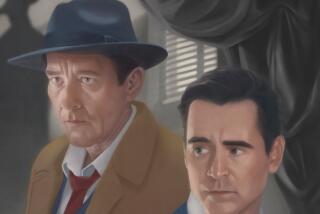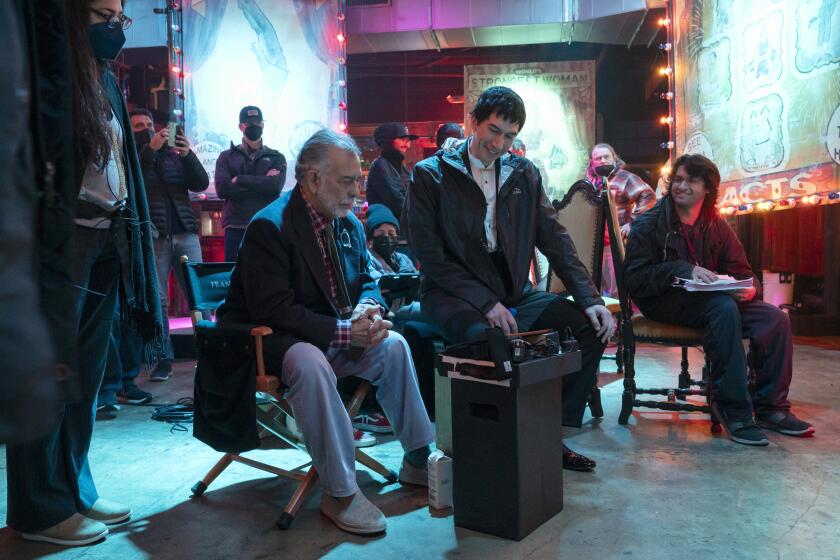A Villain With a Twist
There is a restlessness in Rutger Hauer. You can sense it in the way he chain smokes, in the affinity he feels for his 52-foot sailboat, the Marius, moored for the moment at Marina del Rey and the one place in Los Angeles where he truly feels at home.
Most of all, you can see it in the way his sky-blue eyes are so often drawn to the horizon. The deeper he gets in conversation, the more he gazes away as if somewhere, in the distance, there are answers waiting to be found.
“There’s no discipline in my life,” he is saying, leaning back on the Marius’ canopy-covered deck, taking a long look at the floating neighborhood around him. “I live a month in L.A., a month in Amsterdam, and the rest of the time I’m somewhere else.
“Because you’re never around long enough, people aren’t sure that they can trust you. So they don’t call you. You have to keep telling your friends that you’re still their friend.” Another cigarette is lit. The eyes drift away again.
“There’s a lot of loneliness. I’m alone most of the time. But that’s just the way it is. It’s part of what I do.”
It has been this way for more than a dozen years, ever since Hauer, by his own choosing, became a man torn between two continents, an actor with followings in both America and Europe, unable--or unwilling--to choose between them.
By the time Hauer made his American film debut in 1981’s “Nighthawks” (opposite Sylvester Stallone), his Dutch collaborations with director Paul Verhoeven (“Soldier of Orange”) had established him as a major European star.
And then, in 1982, came “Blade Runner” and the role that proved to be Hauer’s breakthrough American performance but also, in some ways, his curse. As the replicant Nexus 6, Hauer managed to portray not only evil but also charm and a true sense of tragedy. And ever since, he says, that’s how American producers most often see him, as an actor best suited for playing villains with a twist.
“There seems to be a bigger need here to stereotype. They want to put you in a box,” he says.
Maybe not, but in his latest role, Rutger plays the bad guy again. In the HBO movie “Blind Side,” Hauer is a charming, low-key psycho-killer who blackmails and terrorizes a Yuppie couple (Ron Silver and Rebecca DeMornay) after he sees them accidentally run over a man on a desolate Mexican highway.
And, as so often happens, Hauer’s weird-streak malevolence somehow gives him more appeal than the movie’s supposed heroes.
“I find that people are fascinated by evilness,” he says. “Some people are sort of paralyzed by it but, as an actor, I’m not. Part of the freedom that you have as a bad guy is that you can go anywhere, try anything, especially if he’s a psychotic bad guy.”
Still, Hauer can’t help wishing that he had the same range of opportunities here as he does in Europe where, he says, filmmakers aren’t so reluctant to cast him in sympathetic roles.
“My battle with America,” he says, “is to get roles with more sensitivity. I haven’t been able to explore that here.... You have to do commercial things, but you have to be careful or they’ll burn you out. They’ll use you and then they’ll throw you away. But I’ve managed to do this for 20 years, so I must be doing something right.”
It is a little disorienting listening to Hauer because, even though he didn’t take up residence in the United States until 1980, his English is accent-free, Midwestern flat and clean.
“When I realized there might be work for me here,” he says, “I started looking for somebody who could teach me American English. It took me a year and a half, because people would say, ‘What do you mean? English is English.’
“I finally found a man named Robert Easton, who has worked with me ever since. It’s odd; I worked in England last year, and I found myself not understanding the British anymore because I’ve been Americanized in my thoughts to such a large extent.”
He is 48 years old and beginning to wonder if the time isn’t right to shift his attention from acting to directing, something he’s been preparing for during the last 10 years, staying on sets even when he doesn’t have any scenes, just so he can watch other directors work. He has a feature script called “Rain Dogs” that he’d like to direct before 1993 is over.
For the last few years, Hauer has also been working on a video autobiography and a documentary chronicling 30 years in the lives of three Dutch women, a project that obviously will take a while to finish.
“Real life is more mysterious,” Hauer says, explaining why, in the long run, he’d rather direct documentaries than feature films. “And it has a little more truth to it.”
For now, Hauer seems comfortable with the level of fame he’s achieved. “People know me,” he says, “but they’re not quite sure from where. And it’s from something different in each country, but it’s always just enough recognition for them to smile and then look a little confused. And by then, I’m gone. It’s nice that way.”
Rutger Hauer is smiling now, sipping cappuccino between cigarette pulls. You wonder if all this moving about, the transoceanic commutes, the disappearing accent, have cost him his sense of identity.
“No,” he says, “I still feel very much of one culture. My roots are still in Holland. If you have a strong sense of identity, I don’t think you ever lose it. You just have to be aware of where it is.”
And there they go, those sky-blue eyes, off in the horizon once more.
“Blind Side” airs Saturday at 9 p.m. on HBO.
More to Read
Only good movies
Get the Indie Focus newsletter, Mark Olsen's weekly guide to the world of cinema.
You may occasionally receive promotional content from the Los Angeles Times.










